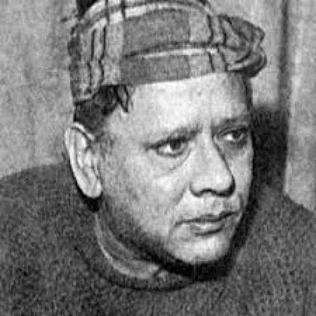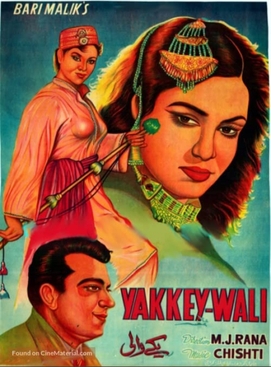
Noor Jehan, sometimes spelled Noorjehan also known by her honorific title Malika-e-Tarannum, was a Pakistani playback singer and actress who worked first in British India and then in the cinema of Pakistan. Her career spanned more than six decades. Considered to be one of the greatest and most influential singers in the Indian subcontinent, she was given the honorific title of Malika-e-Tarannum in British India. She had a command of Hindustani classical music as well as other music genres.
Anjuman Shaheen is a Pakistani film actress and singer. She was one of the most successful Punjabi film heroines of Pakistan during the 1970s, 1980s, and 1990s. She was born in Bahawalpur. Anjuman's parents were from Ahmadpur East, and settled in Multan, where Anjuman was brought up. She later moved to Lahore.
Ghulam Haider (1908 – 9 November 1953), also known by the honorary title Master Ghulam Haider, was a Pakistani music composer who worked both in India and later in Pakistan after its independence in 1947.
Chiragh Deen, known by his pen name Ustad Daman or Daman, was a Pakistani Punjabi-language poet, writer, mystic and a politician. He was active in politics after the establishment of Pakistan but continued his poetic career and till this day is revered as the "people's poet".
Nazim Panipati was a film song lyricist and a film script writer in the Indian and Pakistani film Industries during the 1940s and 1950s.
Ghulam Ahmed Chishti, , (17 August 1905 – 25 December 1994) was a Pakistani music composer, attributed as being one of the founders of Indian and Pakistani film music. He is also sometimes referred to as Baba Chishti.
Musarrat Nazir Khawaja is a Pakistani singer and film actress, who acted in many Urdu and Punjabi films. She, many years later, also sang solo, mostly wedding and folk songs.
Shaukat Ali, also known as Shaukat Ali Khan, was a Pakistani folk singer.
Noel Dias, better known as Saleem Raza, was a Pakistani playback singer. He converted to Islam and started his singing career from Lahore, Pakistan, quickly gaining popularity. Raza was a classically- trained singer and was more famous for singing sad songs. Raza's career suffered due to the rise of singer Ahmed Rushdi in the late 1950s. He left playback singing in 1966 as he lost his popularity with the film composers and moved to Canada where he died in 1983.
Mukhra is a 1988 Pakistani Punjabi film starring Nadeem Baig and Babra Sharif.
Khawaja Pervez, (28 December 1930 – 20 June 2011) was a prominent Pakistani film composer- lyricist and film songwriter for both Urdu and Punjabi language films. His real name was Khawaja Ghulam Mohiuddin. His professional career span was over 40 years.
Abdul Rasheed Attray, also known as Rasheed Attre, was a Pakistani film score composer.
Gernail Singh is a 1987 Pakistani Punjabi-language film, directed by Yunus Malik and produced by Fayyaz Khan. It stars Sultan Rahi, Anjuman, Mustafa Qureshi, Kaifee, Ghulam Mohiuddin, and Chakori.
Daku Raj Punjabi film is a 1992 Pakistani action film. Directed by Idrees Khan, written and produced by Nasir Adeeb. The film starring Sultan Rahi, Javed Sheikh, Neeli, Afshan Qureshi, Ghulam Mohiuddin.
Mohammad Ajmal Qadri was an Indian-born Pakistani actor, best known for his role as Kaido in classic Pakistani Punjabi film Heer Ranjha.

Tanvir Naqvi, also spelled Tanveer Naqvi, was a British Indian and later Pakistani film songs lyricist and poet.
Safdar Hussain was a Pakistani musician who composed playback melodies for Urdu and Punjabi Lollywood films in the decades from 1950s to 1980s.

Yakke Wali is a 1957 Pakistani Punjabi-language film directed by M. J. Rana and produced by Bari Malik. It tells the story of a woman who earns a living by driving a tanga. Musarrat Nazir played the title role in the film with Sudhir, M. Ajmal and Neelo in prominent roles. Yakke Wali is inspired by the short story "License" by Saadat Hassan Manto.
Gulzar Begum, also known as Tamancha Jan was a Pakistani folk singer. She was known as The Singing Siren and The Nightingale of Lahore. She was a popular playback singer of 1930s and 1940s in Cinema of India.


